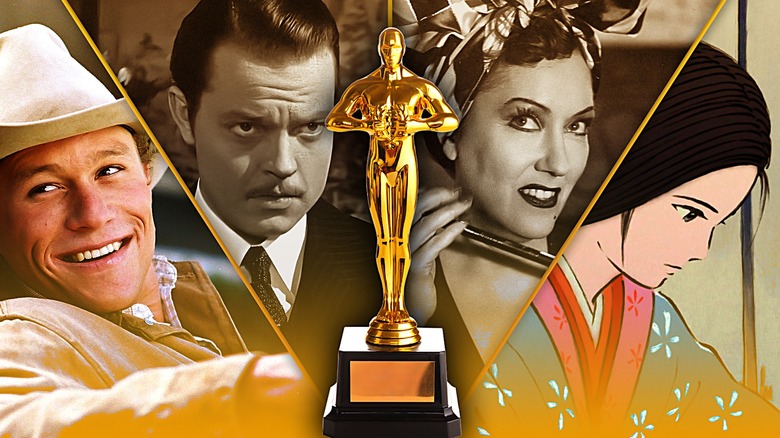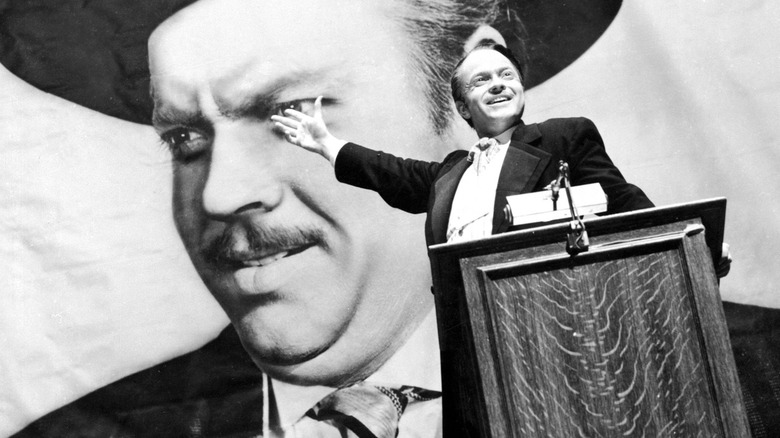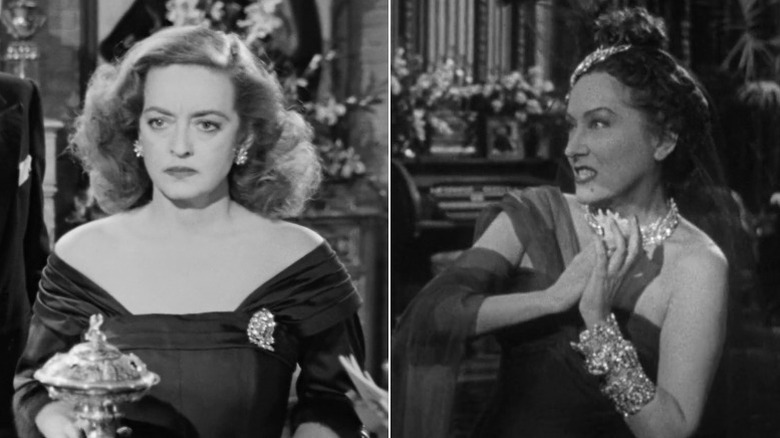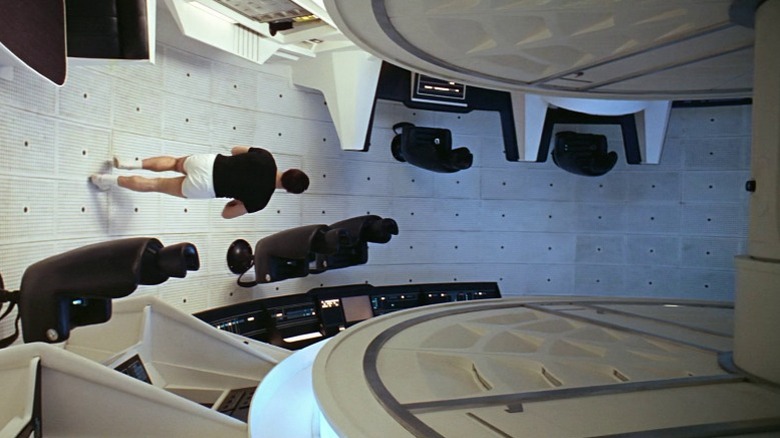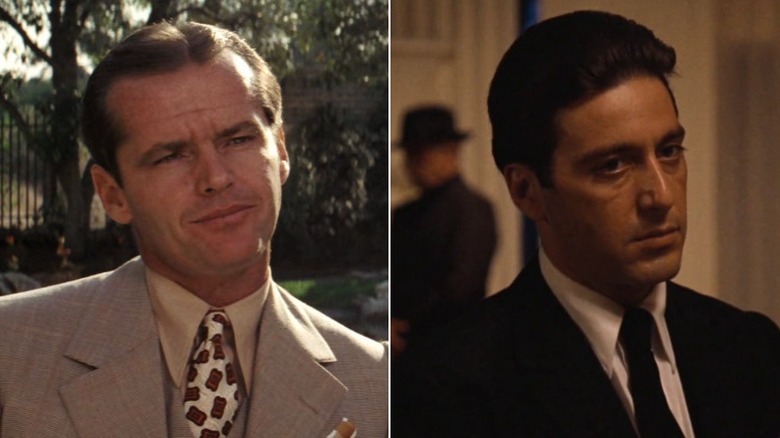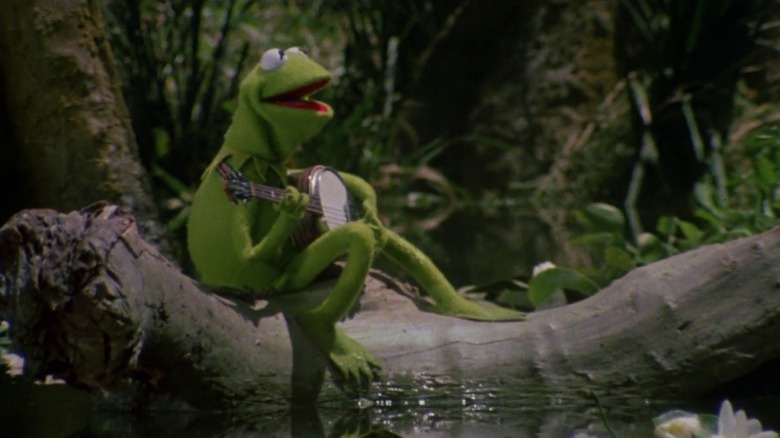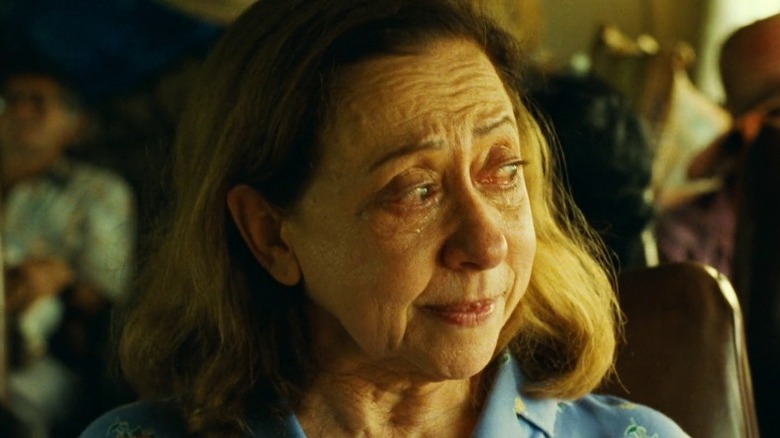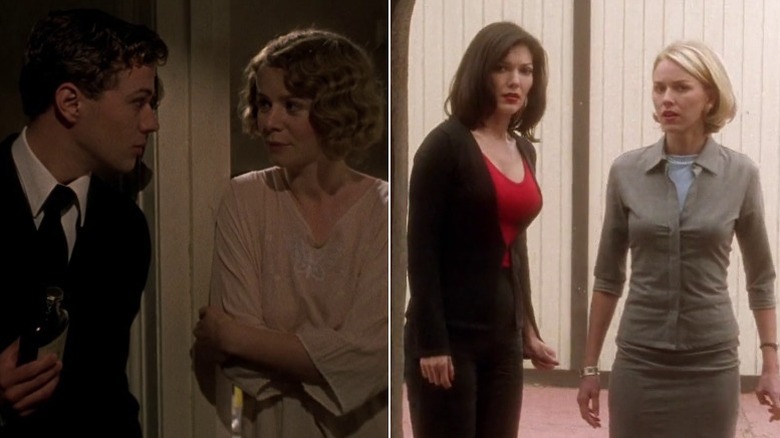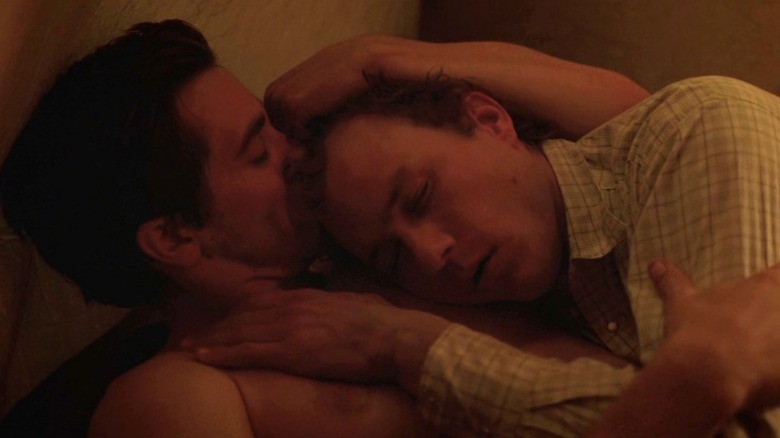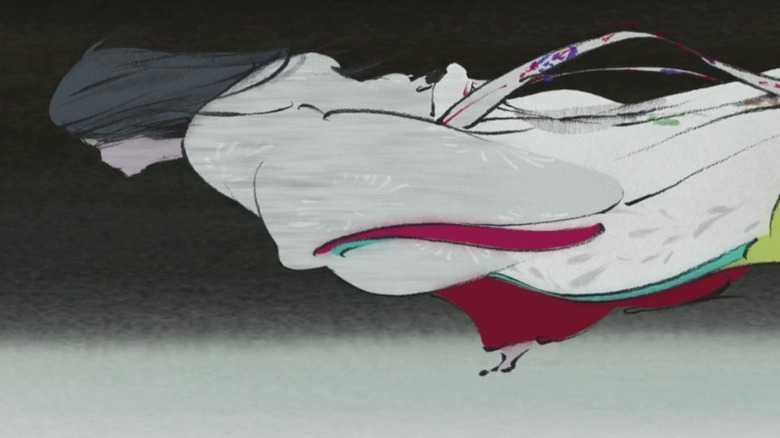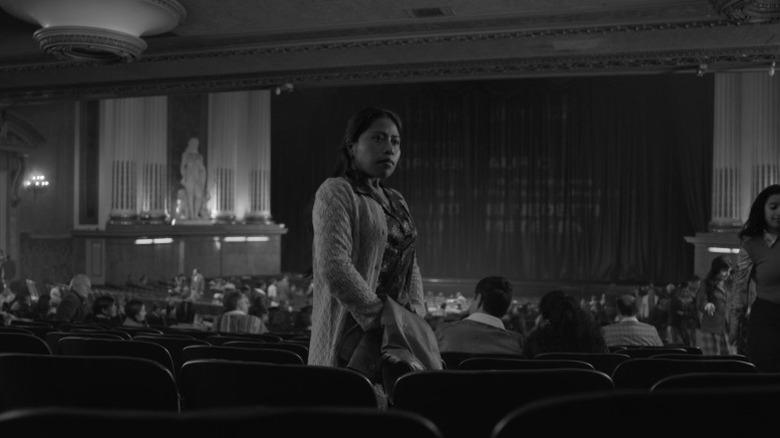The 10 Most Controversial Oscar Snubs Of All Time
Love them or hate them, obsess over them or ignore them altogether, the Academy Awards are a cultural artifact whose history mirrors the very history of American film. Granted, as a gatekeeping and taste-managing institution, the Oscars have always been better at belatedly following and responding to winds of change in the industry than at anticipating or provoking them, and you could probably count on your fingers the number of times that the Oscar statuette in any given category went to a genuinely bold, bracing, game-changing winner. But they're as good a summation of the congealing of critical and commercial mainstream consensus over the decades as we film buffs have. And, as such, it's fascinating to look at the instances of the ultimate winner being so out of lockstep with that consensus as to cause an uproar.
As we gear up for the 97th Academy Awards in March 2025, it's a great time to have a look at the 10 most controversial snubs in Oscar history. Of course, it would be impossible to account for all the great movies and achievements that unfairly missed out on a nomination — "Do the Right Thing" being left out of Best Picture was scandalous, yes, but how many actors in that cast deserved Oscar attention and were never even in consideration? — so "snubs" will be defined, here, as nominated films and artists that ultimately didn't win. Some of these were upsets; some were disappointing but not surprising; some only became infamous with historical hindsight. Groan and gasp at your own discretion.
Citizen Kane losing Best Picture to How Green Was My Valley
The most notorious snub in the history of the Academy Awards may be that the long-held critical and academic consensus pick for best movie of all time did not win Best Picture. What makes the defeat of "Citizen Kane" at the 1942 ceremony especially stunning is its status as an anomaly: Among other comparable totems of American film, "Casablanca" and "The Godfather" and "Gone with the Wind" all won, and the other American movie that has been duking it out with "Citizen Kane" for the #1 spot for the past two decades — Alfred Hitchcock's "Vertigo" — was one of those "initially hated, later reappraised" classics, so it couldn't really have been in contention back in 1959.
"Citizen Kane," though? That movie was acclaimed as a masterwork and a watershed moment for the medium pretty much from the jump, as evidenced by the fact that it got nominated for Best Picture and won Best Original Screenplay. The main reason it lost the main prize was that, after being smeared for months on end by newspaper mogul William Randolph Hearst as part of a full-blown campaign that almost kept "Citizen Kane" from theaters, Welles had become massively unpopular with the contingent of extras who made up a large percentage of Academy voters. Let the record show, however, that the movie that did win — John Ford's Welsh family saga "How Green Was My Valley" — was also a masterpiece, and has been unfairly maligned by history for snatching the gold away from "Kane."
Bette Davis (All About Eve) and Gloria Swanson (Sunset Boulevard) losing Best Actress to Judy Holliday (Born Yesterday)
It's rare that the Oscars get a chance to reward a performance as seismic, iconic, and medium-defining as Bette Davis' in "All About Eve." It's even rarer that they get two chances in the same year: At the 1951 ceremony, in maybe the most competitive Oscars category of all time, Davis' legendary work as Broadway superstar Margo Channing went head-to-head with none other than Gloria Swanson in "Sunset Boulevard." For Davis, it would have been a third career Oscar crowning her as the great capital-A Actress of her Hollywood generation. For Swanson, it would have been the culmination of the most sensational comeback narrative in film history, a faded silent movie icon outshining every talkie starlet in town in the role of a faded silent movie icon.
Alas, neither woman ultimately won. Instead, the Oscar went to a less famous actress in a much lesser-known film: Judy Holliday, reprising the part she'd honed to perfection on the Broadway stage in the screen adaptation of Garson Kanin's "Born Yesterday." "All About Eve's" snub was compounded by the fact that it became the first — and still the only film — to score Oscar nominations for four actresses, with both Davis and Anne Baxter getting into Best Actress, while Celeste Holm and Thelma Ritter snagged Supporting Actress slots. In the end, the only actor from the film to win an Oscar was a man: George Sanders, who took home the Best Supporting Actor statuette.
Stanley Kubrick (2001: A Space Odyssey) losing Best Director to Carol Reed (Oliver!)
Stanley Kubrick was nominated for the Academy Award for Best Director four times, and lost every single one of them. His loss for "Dr. Strangelove" can be excused as a result of the Academy's bias against comedies; his loss for "A Clockwork Orange" is easy to understand in light of the film's highly controversial reception, which remains far from unanimous to this day; his loss for "Barry Lyndon" can be written off as an unfortunate result of getting caught in one of the most crowded Best Director fields of all time (also including Federico Fellini for "Amarcord," Robert Altman for "Nashville," Sidney Lumet for "Dog Day Afternoon," and the winner, Miloš Forman for "One Flew over the Cuckoo's Nest"). His loss for "2001: A Space Odyssey," however, can't really be explained in any satisfying way.
Kubrick's — and, for some, the film medium's — arguable masterpiece didn't win Best Director at the 1969 Oscars for the very same reason that it continues to dumbfound and anger moviegoers both casual and inveterate to this day: It was simply too weird, too challenging, too experimental to lock down a consensus vote. Ironically, Kubrick's defeat prevented another legendary filmmaker from ending his career with zero Best Director statuettes, as Carol Reed's swan-song triumph for "Oliver!" — a win that marked Old Hollywood's last gasp of life — was his only one ever in the category. Incidentally, "2001" also won Kubrick his only Oscar, for Best Special Visual Effects.
Jack Nicholson (Chinatown) and Al Pacino (The Godfather Part II) losing Best Actor to Art Carney (Harry and Tonto)
Wild as it may seem, the planets aligned in such a way at the 1975 Academy Awards that Jack Nicholson's work in "Chinatown" and Al Pacino's work in "The Godfather Part II" were both up for Best Actor simultaneously. In hindsight, it seems almost unbelievable that the Academy would miss out on the chance to award either of the two most iconic New Hollywood stars for maybe their single most definitional film performances. Even more unbelievable is the fact that they lost to a veteran sitcom supporting actor in the only Oscar nomination of his career.
But that's how it panned out at the 47th Oscars, when Nicholson and Pacino both watched Art Carney take the stage to collect a statuette for his work in the Paul Mazursky road comedy "Harry and Tonto," about a widowed retired teacher going on a nostalgic cross-country trip in the company of his cat. Carney's performance was widely acclaimed, and probably would have made an uncontroversial Best Actor winner in any year without such heavyweight competition. In 1975, however, he was bound to go down in history as the guy who beat Jack and Al — especially in light of "Godfather Part II" and "Chinatown" being the year's two most nominated films at 11 nods apiece, with the former winning six awards including Best Picture and the latter nabbing the Best Original Screenplay prize.
Rainbow Connection (The Muppet Movie) losing Best Original Song to It Goes Like It Goes (Norma Rae)
There have been no shortage of controversial wins in the Oscars' Best Original Song field over the decades — going all the way back to 1936, when "Cheek to Cheek" from "Top Hat" lost to the considerably less iconic "Lullaby of Broadway" from "Gold Diggers of 1935" in the category's second year of existence. In the 1970s, as musicals went out of style in Hollywood and the Best Song category largely became a repository of one-off theme songs and credits needle drops, the controversy went into overdrive. From there on out, the Academy fell into an alarming tendency to always reward the showiest, most conventional, most "Oscar"-sounding ballad. No snub demonstrated this more clearly than the "Rainbow Connection" and "It Goes Like It Goes" debacle.
"Rainbow Connection," sung by Kermit (Jim Henson) on the banjo at the beginning of "The Muppet Movie," is a) a perfect song, b) one of the most iconic musical numbers in film history, and c) exactly the kind of big crossover smash hit that the Best Original Song should be made to acknowledge in the post-musical era, having climbed to a stunning #25 spot on the Billboard Hot 100 in November 1979. Yet it lost to "It Goes Like It Goes" from "Norma Rae" — a snub that was immediately derided by critics, with The Washington Post's Tom Shaley, for instance, lamenting "Rainbow Connection's" defeat to an "already forgotten ballad."
Fernanda Montenegro (Central Station) losing Best Actress to Gwyneth Paltrow (Shakespeare in Love)
A fascinating award season narrative seemed to be afoot in 1999. Nearly a year after winning the Berlinale Silver Bear for Best Actress for "Central Station," Brazilian screen titan Fernanda Montenegro was cited as a Best Actress runner-up by the National Society of Film Critics, losing to Ally Sheedy in "High Art." Then, she won another runner-up placement from the New York Film Critics Circle — second to Cameron Diaz in "There's Something About Mary," one of the NYFCC's boldest picks ever. Then, Montenegro won Best Actress from the Los Angeles Film Critics Association, tied with Sheedy, and from the National Board of Review. By the time Oscar night rolled around, with Sheedy and Diaz both snubbed, Montenegro was by far the Best Actress nominee with the most critical support, putting her on track to possibly become the first Latin American winner in the category.
In the end, Miramax campaigning spoke louder than critical passion, and "Shakespeare in Love" star Gwyneth Paltrow prevailed over Montenegro as well as fellow frontrunner Cate Blanchett in "Elizabeth" — a win that became one of the most infamous in Best Actress history. In 2020, the record-holding actress for most Academy Award nominations without a win, Glenn Close, cited Montenegro's loss as an example of the publicity-driven nature of Oscar voting: "I remember the year Gwyneth Paltrow won over that incredible actress who was in 'Central Station' and I thought, 'What?' It doesn't make sense," she told ABC News (via IndieWire).
Robert Altman (Gosford Park) and David Lynch (Mulholland Drive) losing Best Director to Ron Howard (A Beautiful Mind)
If you were to name the two greatest American filmmakers to have broken out post-1970, you could do a lot worse than Robert Altman and David Lynch, who, each in their own way, epitomized singular ways of making and thinking about film that went on to have a massive influence on the entire spectrum of arthouse cinema, both in the U.S. and internationally. At the 2002 Oscars, Lynch was up for Best Director for "Mulholland Drive," the greatest film of the 21st century for many, while Altman was in the mix for his late-career masterwork "Gosford Park." Not only were both films richly deserving of the Best Director honor, but it was a precious opportunity for the Academy to honor one of two giants, neither of whom had ever won an Oscar. And, as ever, the Academy missed it.
Instead, that year's Best Director award went to Ron Howard, for a film that wouldn't even qualify as a high watermark of Howard's career: "A Beautiful Mind." Granted, "A Beautiful Mind" also won Best Picture, an award that goes hand in hand with Best Director more often than not. But controversial Best Picture wins are a dime a dozen; Best Director defeats that anticlimactic are something else entirely. It's no wonder Lynch and Altman's reaction to the announcement, mutually consoling each other while Altman seems to whisper "It's better this way," is a cyclical cinephile meme.
Brokeback Mountain losing Best Picture to Crash
The 2006 Academy Award nominees for Best Picture were "Brokeback Mountain," "Capote," "Crash," "Good Night, and Good Luck," and "Munich." Out of those, "Brokeback Mountain" was the far-out frontrunner by every conceivable metric: A deeply touching, masterfully acted and directed Western romance, it had won the Golden Lion at Venice, topped the majority of critics' year-end lists, snagged Best Picture awards from over 15 critics' associations, and completed the quadrifecta of first-prize precursor wins at the BAFTAs, the Golden Globes, the Producers Guild Awards, and the Directors Guild Awards. At the Oscars proper, it amassed eight nominations, the most of any film that year, and took home Best Director for Ang Lee, Best Adapted Screenplay, and Best Original Score. But, when the time came for Best Picture, a visibly shocked Jack Nicholson announced "Crash" — an oft-reviled film even then — as the winner.
The most likely explanation for that history-making upset, sadly, is rather uninteresting: "Brokeback Mountain" was a gay movie. Old-guard Academy members like Tony Curtis and Ernest Borgnine famously lambasted the film, with Curtis arguing that "This picture is not as important as we make it. The only thing unique about it is they put it on the screen. And they make 'em cowboys" (via Contactmusic). Borgnine, meanwhile, openly confessed, "I didn't see it and I don't care to see it ... If John Wayne were alive, he'd be rolling over in his grave" (via The Advocate). Not until "Moonlight" 11 years later would a gay-centered film finally win Best Picture.
The Tale of the Princess Kaguya losing Best Animated Feature to Big Hero 6
Disney's infamous hold on the Oscars' Best Animated Feature category has resulted in plenty of controversial wins, including "Frozen" beating "The Wind Rises" in 2014, "Zootopia" beating "Kubo and the Two Strings" in 2017, and "Encanto" beating "The Mitchells vs. the Machines" in 2022. And, while each of those winners could be excused as a massive audience smash and cultural lightning-in-a-bottle moment, one instance of a Disney movie defeating the critical favorite was patently absurd no matter how you slice it: "Big Hero 6" beating "The Tale of the Princess Kaguya."
An epic, exquisite, astonishingly-animated masterpiece, "The Tale of the Princess Kaguya" was one of the most acclaimed films of 2014 by far, animated or otherwise, as well as a momentous late-career comeback for Isao Takahata, the underappreciated half of Studio Ghibli behind "Grave of the Fireflies" and "Only Yesterday." With no American cultural sensations in the playing field in 2015, it was widely expected that the Academy would take that opportunity to reward an animation legend for the greatest, most envelope-pushing work of his career.
Instead, to the outrage of animation fans the world over, the Academy went with "Big Hero 6" — a pretty decent superhero movie with pretty decent reviews and pretty decent box office earnings, which most people had already forgotten about in the time between its fall release and the Oscar ceremony. The only discernible reason for its victory was the studio logo at the top.
Roma losing Best Picture to Green Book
The 2019 Best Picture race was, in many ways, a battle for the soul of the Oscars. Following the years of Academy membership renewal which had resulted in welcome, refreshing results like a Best Picture win for "Moonlight," 2019 symbolically pitted the new — in the form of "Roma," a Spanish and Mixtec-language arthouse Mexican film giving epic consideration to the life of an indigenous Mexico City maid (played brilliantly by then-newcomer Yalitza Aparicio) — against the old — in the form of "Green Book," a mawkish and historically inaccurate race-relations dramedy wringing feel-good fuzziness and white savior antics out of Jim Crow-era segregation.
"Roma" had the critics, the buzz, the prestige weight; "Green Book" had the mass appeal, the box office, the TIFF People's Choice Award. "Roma" had international cinema deity Alfonso Cuarón doing his most personal and ambitious work yet; "Green Book" had Hollywood raunch-com Midas Peter Farrelly proving his mettle as a "serious" filmmaker. "Roma" had Netflix; "Green Book" had Universal Pictures.
It's impossible to know what was on the mind of each Academy voter who ultimately went with "Green Book." One way or another, Farrelly's victory was widely interpreted as the Academy willfully — maybe even reactionarily — opting for the old. Critics immediately christened "Green Book" as the new benchmark for embarrassing Best Picture picks, supplanting "Crash," and the resulting backlash may well have contributed to the Academy course-correcting the following year by not snubbing the foreign-language movie and showering "Parasite" with glory.
